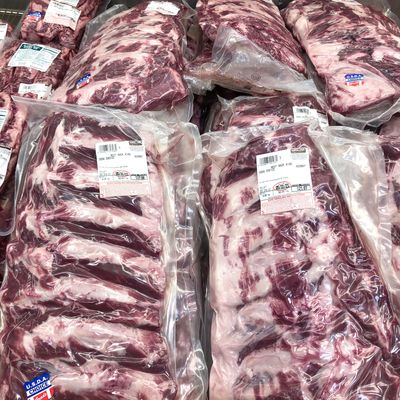
It’s been a hell of a year for global supply chains. First, a big ship got stuck in the Suez Canal; then prices for commodities such as lumber surged as a result of the demand for new housing; and then a cyberattack cut off the East Coast’s gasoline supply. Now it looks like there could be a meat shortage in the United States thanks to another cyberattack, this time on a Brazilian beef firm.
On Sunday, the largest beef producer in the world, JBS S.A., was targeted in a cyberattack that has closed many of its massive slaughterhouses, including five in the U.S., which process some 22,500 cattle every day. As Bloomberg states, it’s not yet known how many plants around the world have been shut down from the attack, although slaughter operations have been “paralyzed” in Australia, according to one trade group. Canada’s largest beef facility has also been offline for two days. As they deal with the attack, JBS has suspended its computer systems in North America and Australia, meaning that a full 23 percent of the American beef-producing industry is on pause. JBS reports that the attack hit its information-technology servers but did not state if its operational technology was impacted, which would be a significantly worse breach. Livestock futures dipped on Tuesday as a consequence of the hack.
On Tuesday, White House Deputy Press Secretary Karine Jean-Pierre told reporters that the Biden administration has offered to aid JBS in the wake of the ransomware attack, which she said was likely conducted by a Russian criminal organization. “The White House is engaging directly with the Russian government on this matter and delivering the message that responsible states do not harbor ransomware criminals,” Jean-Pierre said, adding that the administration would take action to ensure beef supplies are not severely impacted. Bus as the Steiner Consulting Group, a firm researching the meat industry, wrote on Tuesday: “Even one day of disruption will significantly impact the beef market and wholesale beef prices.”
As Bloomberg notes, the attack comes at an uncertain moment for the beef industry in the United States, after a year of scrutiny following massive coronavirus outbreaks in slaughterhouses:
Cattle producers were already seething over a surge in retail prices for hamburger and steaks while the prices processors pay for livestock barely budge. Congress has been examining legislation to address cattle markets and rural lawmakers recently pressed the Justice Department for action on an anti-trust investigation of the beef industry launched last year.
Out of concern that the attack could spread, several pork- and chicken-processing plants closed as well; Pilgrim’s Pride Corp, the second largest chicken producer in the United States, has also temporarily suspended operations.
The JBS hack comes only three weeks after Colonial Pipeline Co., the operator of the United States’ largest gasoline pipeline, shut down following a ransomware attack, revealing the weaknesses of private infrastructure in the U.S. to cyber threats. (The public sector is not bulletproof either: This winter, the U.S. government reported that Russian hackers infiltrated the computer systems of several federal departments, including Treasury, Commerce, and Energy.) Earlier this month, to relieve the situation — which caused massive gas shortages in the South and along the Eastern Seaboard — Colonial paid $4.4 million to the criminal network that hacked them.






























